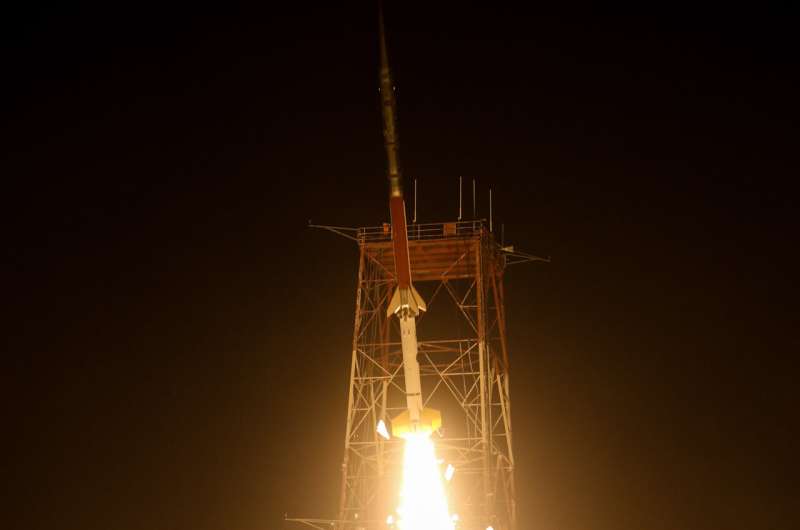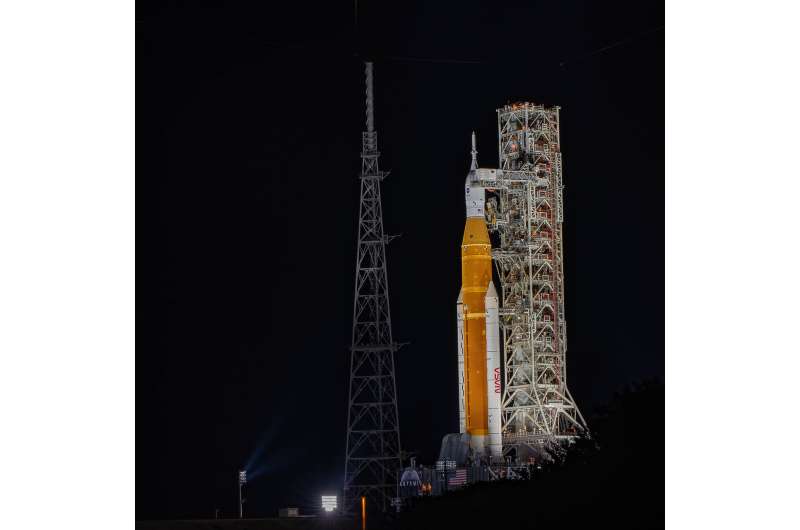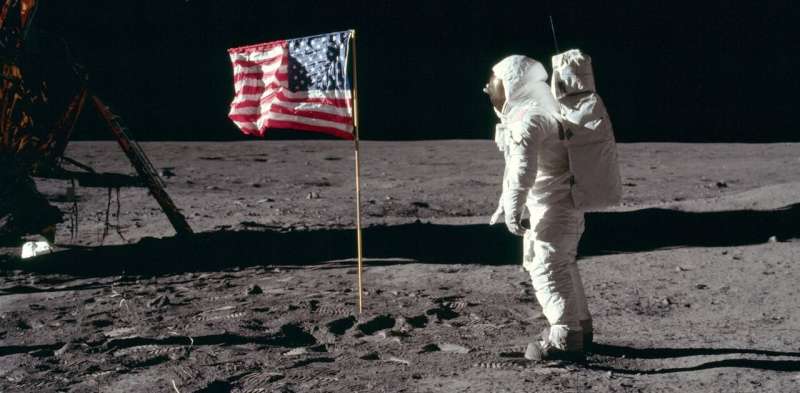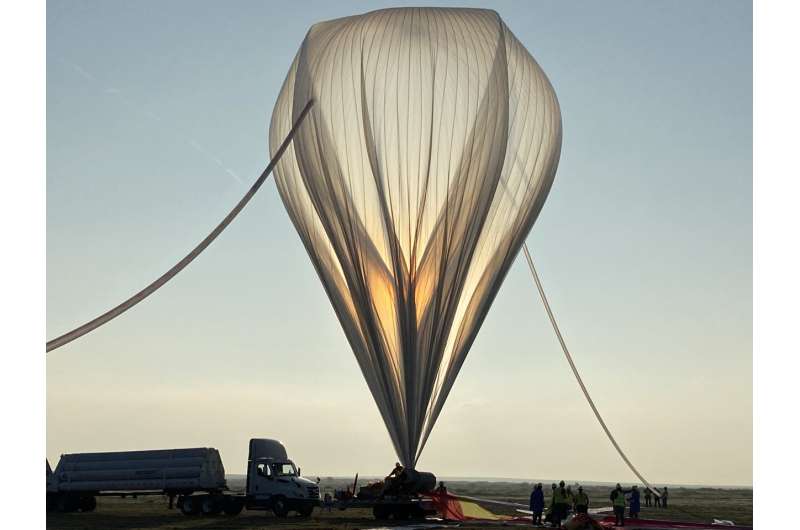
Copernical Team
NASA Wallops launch supports SpEED Demon testing science instruments

A sounding rocket launch testing science instruments for future missions was successfully conducted at 9:16 p.m. EDT, Aug. 23, 2022, from NASA's Wallops Flight Facility in Virginia.
The Terrier-Improved Malemute carried the Sporadic-E ElectroDynamics Demonstration mission, or SpEED Demon, to an apogee of 100 miles before descending and landing in the Atlantic Ocean. The experiment was not planned to be recovered.
The purpose of the SpEED Demon mission was to test new instrumentation along with heritage instruments that have flown on other sounding rocket missions, but not together.
The SpEED Demon instruments will be further improved based on results from this launch and will subsequently fly on a science mission targeted for summer 2024 from the Kwajalein Atoll in the Marshall Islands and possibly many other sounding rocket opportunities.
"This was an excellent mission. Preliminary analysis shows that we flew through a Sporadic E event on the downleg and the data looks great. We'll be looking at the performance of all instruments to get us ready for the 2024 launch," said Aroh Barjatya, SpEED Demon principal investigator and director of the Space and Atmospheric Instrumentation Lab at Embry-Riddle Aeronautical University in Daytona Beach, Florida.
Working in tandem: NASA's networks empower Artemis I

NASA's Artemis missions are returning humanity to the Moon and beginning a new era of lunar exploration. Soon, the agency plans to launch the Artemis I mission, an uncrewed flight test that will take a human-rated spacecraft farther than any before.
Although uncrewed, Artemis I will test essential systems for future crewed missions to the lunar region, including the first-ever launch of NASA's most powerful rocket, the Space Launch System (SLS). The SLS rocket will launch from NASA's Kennedy Space Center in Cape Canaveral, Florida, and enter a complex orbit to bring the Orion spacecraft to the Moon.
Negotiations are underway to avoid conflict and damage to spacecraft between international moon missions

It's been 50 years since humans last visited the moon, and even robotic missions have been few and far between. But the Earth's only natural satellite is about to get crowded.
At least six countries and a flurry of private companies have publicly announced more than 250 missions to the moon to occur within the next decade. Many of these missions include plans for permanent lunar bases and are motivated in large part by ambitions to assess and begin utilizing the moon's natural resources. In the short term, resources would be used to support lunar missions, but in the long term, the moon and its resources will be a critical gateway for missions to the broader riches of the solar system.
But these lofty ambitions collide with a looming legal question. On Earth, possession and ownership of natural resources are based on territorial sovereignty.
NASA to fly six scientific balloons from New Mexico

NASA's Scientific Balloon Program is moving full-steam ahead into the fall 2022 campaign with six scientific, engineering, and student balloon flights supporting 17 missions. The flights are scheduled to launch from Fort Sumner, New Mexico, from mid-August through mid-October.
With one balloon already off the ground, a test flight carrying several different technology payloads and other piggyback missions, the team hopes to launch the five remaining balloons by the end of the launch window in support of multiple science and technology initiatives.
"Our balloon platforms can lift several thousand pounds to the edge of space, allowing for multiple, various scientific instruments, technologies, and education payloads to fly together on one balloon flight," said Debbie Fairbrother, Scientific Balloon Program chief at NASA's Wallops Flight Facility in Virginia.
Some of the science missions flying this campaign include the BALloon-Based Observations for sunlit Aurora (BALBOA), testing a wide-view infrared camera designed to study daytime auroras; the Planetary Imaging Concept Testbed Using a Recoverable Experiment—Coronagraph (PICTURE-C) mission that will directly image and characterize dust and debris orbiting nearby stars with the possibility of detecting bright, gas giant planets outside our solar system using a telescope; the TinMan mission hopes to better understand the effects of thermal neutrons in Earth's atmosphere on aircraft electronics; and the 16th High-Altitude Student Platform (HASP) mission that will fly 12 student-built payloads.
The global hunt for dark matter has arrived in Australia at the Stawell Underground Physics Laboratory
 Located 1km underground in the Stawell Gold Mine, the first dark matter laboratory in the southern hemisphere is preparing to join the global quest to understand the nature of dark matter and unlock the secrets of our universe.
Recently unveiled, the Stawell Underground Physics Laboratory (SUPL) will be the new epicentre of dark matter research in Australia.
Lead researcher on the pr
Located 1km underground in the Stawell Gold Mine, the first dark matter laboratory in the southern hemisphere is preparing to join the global quest to understand the nature of dark matter and unlock the secrets of our universe.
Recently unveiled, the Stawell Underground Physics Laboratory (SUPL) will be the new epicentre of dark matter research in Australia.
Lead researcher on the pr China's space tracking ship sails for monitoring missions
Case solved: missing carbon monoxide was hiding in the ice
 Astronomers frequently observe carbon monoxide in planetary nurseries. The compound is ultra-bright and extremely common in protoplanetary disks - regions of dust and gas where planets form around young stars - making it a prime target for scientists.
But for the last decade or so, something hasn't been adding up when it comes to carbon monoxide observations, says Diana Powell, a NASA Hubb
Astronomers frequently observe carbon monoxide in planetary nurseries. The compound is ultra-bright and extremely common in protoplanetary disks - regions of dust and gas where planets form around young stars - making it a prime target for scientists.
But for the last decade or so, something hasn't been adding up when it comes to carbon monoxide observations, says Diana Powell, a NASA Hubb Orbex to hire fifty new staff over next six months, in final countdown to UK rocket launch
 UK-based launch services company Orbex is hiring an additional fifty staff members over the next six months. The new team members will support the company's final push to prepare for the first vertical rocket launch from UK soil over the coming months.
Many of the new roles will support 'integrated testing' of the complete rocket at the Orbex LP1 launch platform test facility at Kinloss. T
UK-based launch services company Orbex is hiring an additional fifty staff members over the next six months. The new team members will support the company's final push to prepare for the first vertical rocket launch from UK soil over the coming months.
Many of the new roles will support 'integrated testing' of the complete rocket at the Orbex LP1 launch platform test facility at Kinloss. T New study examines how many moons an earth-mass planet could host
 A new study by a trio of physics researchers attempts to quantify how many moons the Earth, or an exoplanet with the mass of Earth orbiting a Sun-like star, could host in its orbit. Their findings: Anywhere from three to seven, depending on the moon's mass.
The study, titled "Moon-packing around an Earth-mass planet", was published in the August 1 online edition of the Monthly Notices of t
A new study by a trio of physics researchers attempts to quantify how many moons the Earth, or an exoplanet with the mass of Earth orbiting a Sun-like star, could host in its orbit. Their findings: Anywhere from three to seven, depending on the moon's mass.
The study, titled "Moon-packing around an Earth-mass planet", was published in the August 1 online edition of the Monthly Notices of t Ready for its close-up: New technology sharpens images of black holes
 When scientists unveiled humanity's historic first image of a black hole in 2019 - depicting a dark core encircled by a fiery aura of material falling toward it - they believed even richer imagery and insights were waiting to be teased out of the data.
Simulations predict that, obscured by that bright orange glow, there should exist a thin, bright ring of light created by photons flung aro
When scientists unveiled humanity's historic first image of a black hole in 2019 - depicting a dark core encircled by a fiery aura of material falling toward it - they believed even richer imagery and insights were waiting to be teased out of the data.
Simulations predict that, obscured by that bright orange glow, there should exist a thin, bright ring of light created by photons flung aro 
